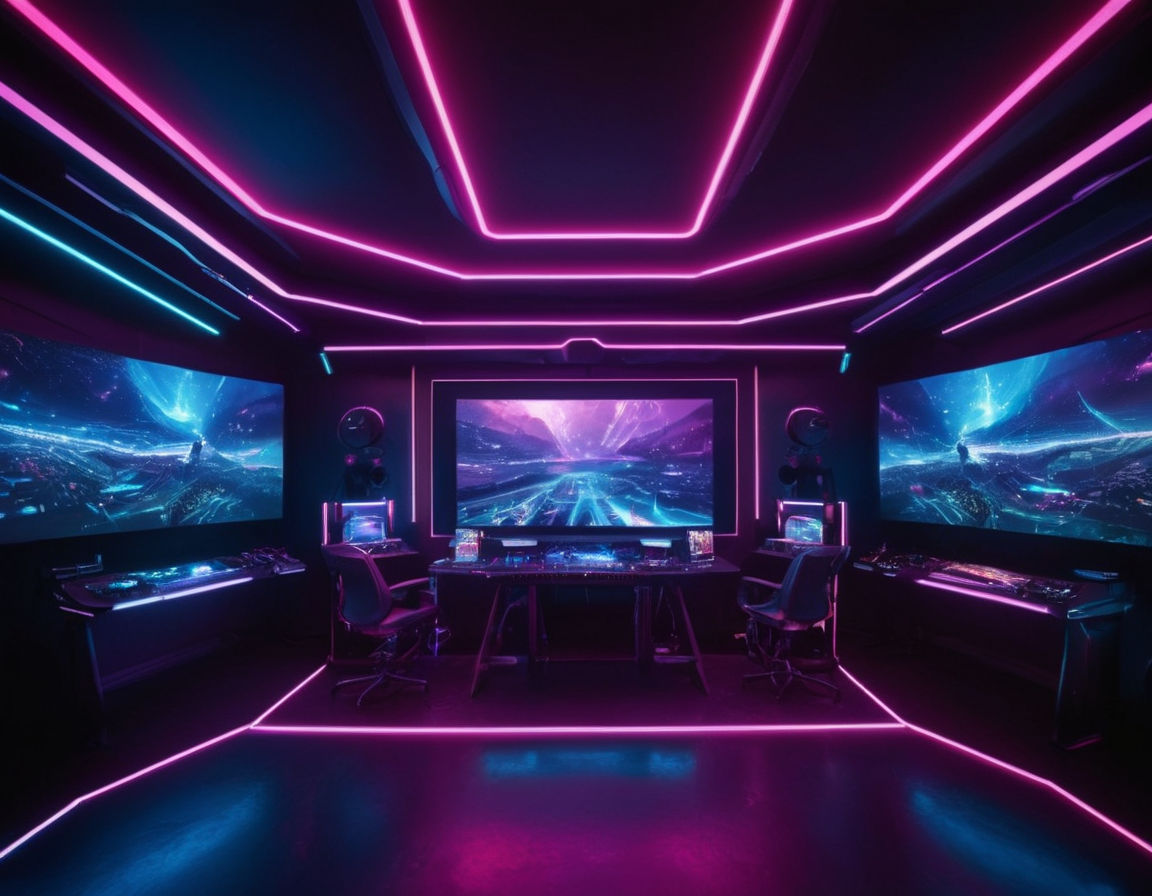Introduction
Sound design is a critical element that significantly impacts the immersive experience in video games. When executed effectively, sound design can elevate gameplay, evoke emotions, and transport players into the virtual worlds they explore. One of the key pillars that support the captivating nature of video games is the meticulous craft of Sound Design in Games. This article delves into the pivotal role of sound design in video games, highlighting how it enhances player engagement and overall gaming experience.
Understanding Sound Design in Video Games
In the realm of video games, sound design refers to the creation and integration of audio elements such as music, sound effects, dialogues, and ambient noise. These auditory components are strategically utilized to build atmosphere, convey narrative, provide feedback, and immerse players in the game world. Sound design goes beyond mere background noise; it is a dynamic tool that adds layers of depth and interactivity to the gaming environment.
The success of a game often hinges on the seamless integration of sound design. It plays a crucial role in shaping the player's perception and emotions throughout their gaming journey. From the subtle rustling of leaves to the thunderous roar of explosions, every sound is meticulously crafted to enhance the overall gaming experience. Balancing audio elements, ensuring that sound effects are neither overwhelming nor underwhelming, is essential to maintaining player engagement and immersion.
Importance of Balancing Audio Elements in Games
Balancing volume levels to prevent auditory fatigue
Ensuring that sound effects are contextually appropriate
Using audio cues to guide players without being intrusive
Techniques for Enhancing the Gaming Experience through Sound Design
Sound designers employ a variety of techniques to create a rich auditory landscape that enhances the gaming experience. One of the most powerful techniques is the implementation of immersive audio effects, which envelop players in a 360-degree soundscape, heightening their sense of presence within the game world. By leveraging spatial audio technology, sound designers can create a more realistic and engaging environment for players to explore.
In addition to immersive audio effects, sound designers also utilize cutting-edge sound technology to push the boundaries of audio innovation in gaming. Advancements in sound processing, dynamic audio mixing, and procedural audio generation allow for more dynamic and responsive soundscapes. These technologies enable sound designers to adapt the audio experience in real-time, responding to player actions and environmental changes to maintain a high level of immersion.
By mastering these techniques and leveraging the latest advancements in sound technology, game developers can create audio experiences that truly transport players to fantastical realms, evoke powerful emotions, and enrich the overall gaming experience.

Ensure that the sound of victory is clear with your strategic use of Sound Design in Games. Dive deep into the realm of audio engineering and immersive soundscapes to enhance player immersion and elevate the gaming experience.
Memorable Game Soundtracks
Video game soundtracks play a crucial role in creating an immersive gaming experience. They have the power to evoke emotions, enhance gameplay, and leave a lasting impact on players. Here are some iconic game soundtracks that have significantly contributed to the overall gaming experience:
The Legend of Zelda: Ocarina of Time - Known for its beautiful and memorable melodies, this soundtrack adds depth to the game's narrative and creates a sense of adventure and nostalgia for players.
The Last of Us - With its haunting and emotional score, this soundtrack effectively conveys the game's post-apocalyptic atmosphere and intensifies the player's emotional connection to the story.
Halo series - Featuring epic orchestral compositions, the Halo series' soundtrack heightens the game's intense battles and futuristic setting, immersing players in the sci-fi world.
Music in gaming not only sets the tone for different game scenarios but also influences player emotions and engagement. Soundtracks can evoke feelings of excitement, suspense, joy, or sadness, enhancing the overall gaming experience. Additionally, music has the power to convey emotions and assist in storytelling, making the gameplay more immersive and captivating for the players.
Role of Audio Feedback in Player Engagement
Audio feedback in video games is vital for creating a dynamic and engaging gameplay experience. Sound effects, in particular, play a significant role in providing players with important cues, feedback, and information during gameplay. These audio cues can influence player decisions, reactions, and overall immersion in the game world.
By using innovative audio feedback, game developers can enhance player interactions and make gameplay more immersive. For example, the sound of footsteps approaching can alert players to incoming danger, while the distinct sound of a successful attack can provide satisfying feedback for their actions. Games like Overwatch and Fortnite have mastered the use of audio feedback to keep players engaged and alert during gameplay.
The Evolution of Sound Technology in Gaming
Over the years, the gaming industry has witnessed remarkable advancements in sound technology, revolutionizing the way audio is integrated into games. From simple MIDI melodies to complex surround sound systems, the evolution of sound technology has significantly improved player immersion and realism in gaming experiences.

Innovations in audio technology, such as dynamic sound mixing, spatial audio, and realistic environmental effects, have changed the way players perceive and interact with game worlds. These advancements not only enhance the overall gaming experience but also contribute to the creation of more realistic and immersive virtual environments.
Looking ahead, the future of sound design in video games is promising. With the rise of virtual reality (VR) technology and haptic feedback systems, game developers have even more opportunities to push the boundaries of audio innovation. By incorporating cutting-edge sound technologies, such as 3D audio and personalized sound profiles, the gaming industry is set to deliver even more immersive and captivating soundscapes for players to enjoy.
Enhancing Player Immersion Through Sound Design
Sound design plays a critical role in the overall gaming experience by enhancing player immersion and creating a more engaging environment. Let's delve into how sound design contributes to this immersive experience and how it connects players to the game world.
Importance of Sound Design in Creating Immersive Gaming Environments
Setting the Ambiance: Sound design sets the tone for the game environment, whether it's a dark, ominous atmosphere or a lively and vibrant world. The sounds of footsteps, rustling leaves, or distant whispers help players feel like they are truly part of the game world.
Emotional Impact: Soundtracks and sound effects trigger emotional responses in players. A suspenseful music score can make a tense situation even more gripping, while the sound of victory can elicit feelings of achievement and success.
Spatial Awareness: Immersive audio cues can provide players with spatial awareness, helping them navigate the game world more effectively. This is especially crucial in multiplayer games where being able to locate opponents based on sound can be a game-changer.
Incorporating Sound Design to Enhance Player Immersion
Dynamic Soundscapes: Dynamic soundscapes that react to in-game events can significantly enhance immersion. For example, the sound of rain intensifying as a storm approaches or the muffled sound underwater adds layers of realism to the gaming experience.
Interactive Sound Effects: Interactive sound effects that respond to player actions can make the gameplay more engaging. The distinct sound of a weapon reloading or the satisfying feedback of a successful combo attack can make players feel more connected to their in-game actions.
Attention to Detail: Attention to detail in sound design, such as the sound of different surfaces underfoot or the variation in environmental sounds, adds depth to the game world. These subtle nuances can make the virtual environment feel more alive and realistic.
Conclusion
In conclusion, sound design is a pivotal element in video games that significantly contributes to the overall player experience. From setting the ambiance to creating emotional impact and enhancing spatial awareness, sound design plays a multifaceted role in immersing players in the game world.
The lasting impact of sound design on player immersion cannot be overstated. Memorable soundtracks and innovative sound effects can stay with players long after they have completed a game, enhancing their recollection of the gaming experience.

As you continue to explore the world of game audio engineering, remember the crucial role that sound design plays in shaping the way we interact with and experience video games. Dive deeper into the realm of immersive audio and discover the endless possibilities for enhancing player connectivity through sound technology.
Remember, the next time you pick up a controller, pay attention to the smallest sounds around you—they might just be the key to unlocking a truly immersive gaming experience.



